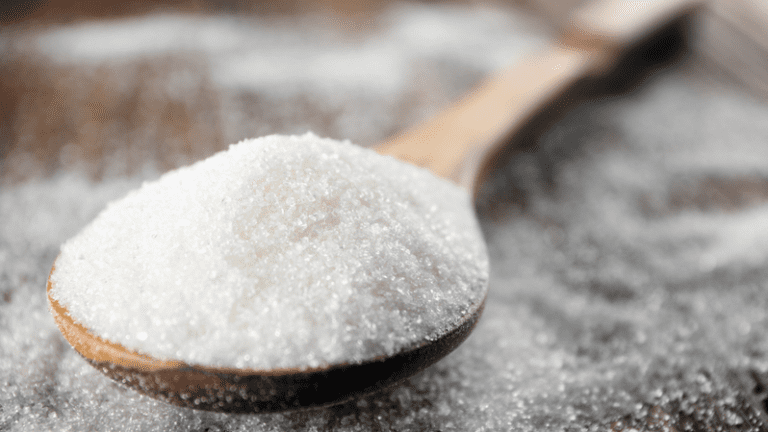“Sugar is a total waste of calories. I don’t touch the stuff.”
“I have such a sweet-tooth. My day is grim without some sugar in it.”
“Before I compete, I eat a spoonful of honey to boost my energy.”
If you are like most of my clients, you are confused about the role of sugar in your daily sports diet. The anti-sugar media reports sugar is health-erosive, yet sports nutrition researchers claim sugar is performance enhancing. That might leave you wondering: Should I eat sugar or avoid it?
To address this conflict, I’ve summarized a sugar debate published in 2018 in the Journal of Progressive Cardiovascular Disease. The article, critique, and editorial do a good job of examining the question: Have the ill effects of those toxic white crystals in your diet been over-emphasized? Here is some information to help you better understand the two sides to the Sugar Wars debate.
Sugar is Evil (1)
• Sugar is not an essential nutrient. Our bodies can make sugar (glucose) from the dietary fat and protein that we eat, or by breaking down our body’s muscle and adipose tissue.
• The average American eats about 100 pounds of sugar per year; that’s 2 pounds a week and contributes abundant empty calories.
• Populations with a high intake of added sugars tend to have health issues. Reducing added sugar to less than 10% of total calories reduces risk of overweight, obesity, and tooth decay.
• Dietary sugar drives up blood sugar. Routinely consuming 150 sugar-calories each day (i.e., one can of soda) increases the risk of developing diabetes by 1%. Much of this sugar is hidden in packaged foods.
• Metabolizing added sugar (with no nutritional value) requires vitamins and minerals. With very high sugar consumption (and low intake of other nourishing foods), one could become nutrient depleted.
• Trading empty sugar calories for nutrient-rich calories is a no-brainer. Limiting sugar intake does not harm anyone.
Sugar is OK for People Who Are Fit (2)
• Sugar consumption increased from less than 10 lbs. per person per year in the late 1800’s to about 100 lbs. per person per year by World War II. Consumption remained relatively flat until 1980. Our health also improved between 1880 and 1980—so is it fair to say that the increase in sugar hurt our health?
• Sugar (and starch—a string of sugar molecules linked together) is in breast milk, dairy foods, fruit, honey, potato, wheat, corn, quinoa, and all grains.
People around the globe have consumed these “carbs” for years. So why now do sugar and starch suddenly become responsible for creating human obesity and diseases?
• The fear-mongering terms of unhealthy, toxic and poisonous are simply unscientific. People who lack knowledge about physiology accept this disease-mongering, anti-sugar rhetoric. But the fact is no one food is healthy or unhealthy.
• Our present state of poor health is not because our diets are unhealthy or that we consume sugar, but because we are physically inactive. Low levels of physical inactivity reduce our ability to metabolize sugar optimally, and that explains the true cause of obesity and metabolic diseases.
• In terms of diabetes, blood sugar, not dietary sugar, matters. The rise in blood sugar that occurs after eating is not pathological but rather the failure of the muscles and liver to take up the sugar. That is, it’s not what you eat, but what your body does with what you eat.
• Physical activity affects appetite and energy intake. If we are too inactive and live a sedentary lifestyle, energy intake gets dissociated from energy expenditure. We can easily eat more calories than we burn. Lack of physical activity negatively impacts metabolic health.
• A maternal effect impacts both pre- and post-natal development.
Children of inactive mothers are born increasingly predisposed to inherited childhood obesity and Type II Diabetes. This increases with each passing generation.
Concluding comments (3)
Lack of physical activity, more so than sugar, is the greater threat to our health.
Given that so many people are overfat and underfit, a diet low in sugars and starches is likely a good idea for them. But for sports-active, fit people—who are at lower risk for heart disease, diabetes, and obesity—sugar and carbs are not toxic but rather a helpful way to enhance athletic performance. The one size diet does not fit all.
No one is suggesting that athletes should eat more sugar, but rather understand that, as an athlete, you can embrace a sports diet that includes an appropriate balance of carbohydrate (sugars and starches) in each meal.
Strive for a healthy eating pattern that includes 85% to 90% quality foods and 10% to 15% whatever. Some days, whatever might be an apple; other days, it might be a slice of apple pie.
Addendum: If you are fearful sugar will harm your health, note that fear-mongering relies on cherry-picked scientific information that can prove what the messenger wants to prove. Fear-mongering messengers have created a general distrust of Big Food, and have shaped opinions that support raw foods, super foods, whole foods, organic foods, and clean eating. While a plant-based diet built on unprocessed foods with no added sugar is ideal, I commonly see athletes who take the advice to the extreme and eat “too clean” (orthorexia). That is not healthy, either.
My suggestion: Enjoy a balanced variety of foods, in moderation. The US Dietary Guidelines recommend limiting added sugar to less than 10% of your total calories (about 250+ sugar-calories per day for an active woman who might require about 2,500+ calories a day) Enjoying a daily small sweet seems better than routinely “cheating” with sugar-binges. Does the age-old advice to enjoy a balanced variety of foods—with a sprinkling of sugar, if desired—seem a reasonable goal?
This article is based on information from the Journal of Progressive Cardiovascular Disease (August, 2018)
References:
1) DiNioloantonio JJ, O’Keefe JH. In critique of “In Defense of Sugar: The Nuance of Whole Foods. https://doi.org/10.1016/j.pcad.2018.07.006
2) Archer E. In Defense of Sugar. https://doi.org/10.1016/j.pcad.2018.07.013
3) Lavie CJ. Sugar Wars -Commentary From the Editor https://doi.org/10.1016/j. pcad.2018.07.007
Nancy Clark, MS, RD, CSSD (Board Certified Specialist in Sports Dietetics) counsels both casual and competitive athletes at her office in Newton, MA (617-795-1875). Her best selling Sports Nutrition Guidebook and food guides for marathoners, cyclists and soccer players offer additional information. They are available at www.NancyClarkRD.com. For her popular online workshop, see www.NutritionSportsExerciseCEUs.com.
CoachUp is the safest and easiest way to find a coach for personalized training. With our 100% money-back guarantee and vetted coaches, anyone can achieve their full athletic potential. Find your perfect coach today and become the athlete you want to be!
How useful was this post?
Click on a star to rate it!
Average rating 0 / 5. Vote count: 0
No votes so far! Be the first to rate this post.



